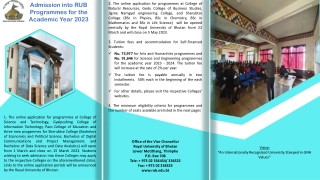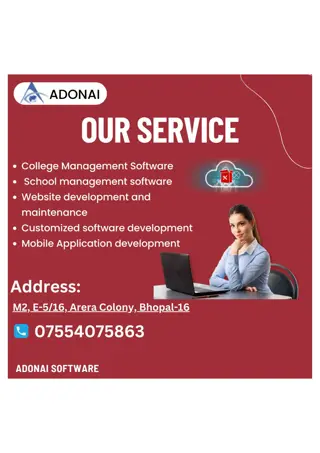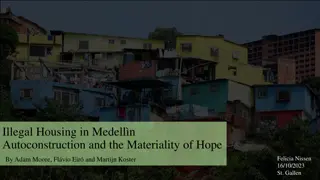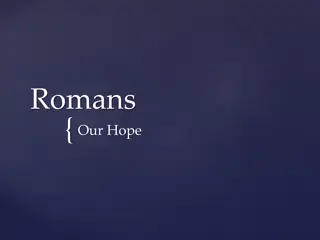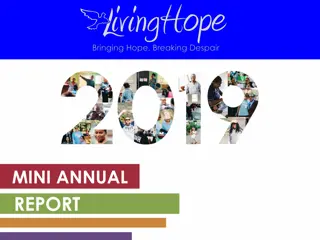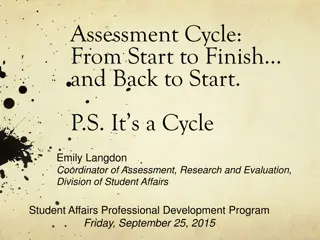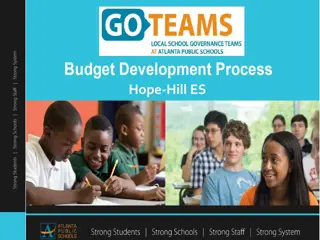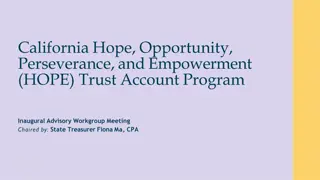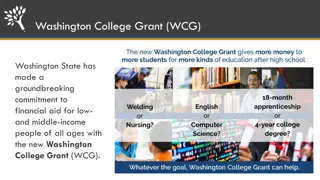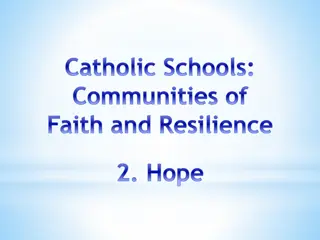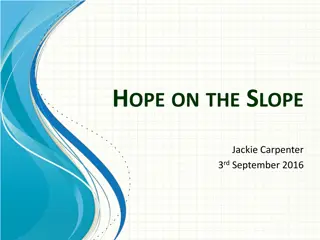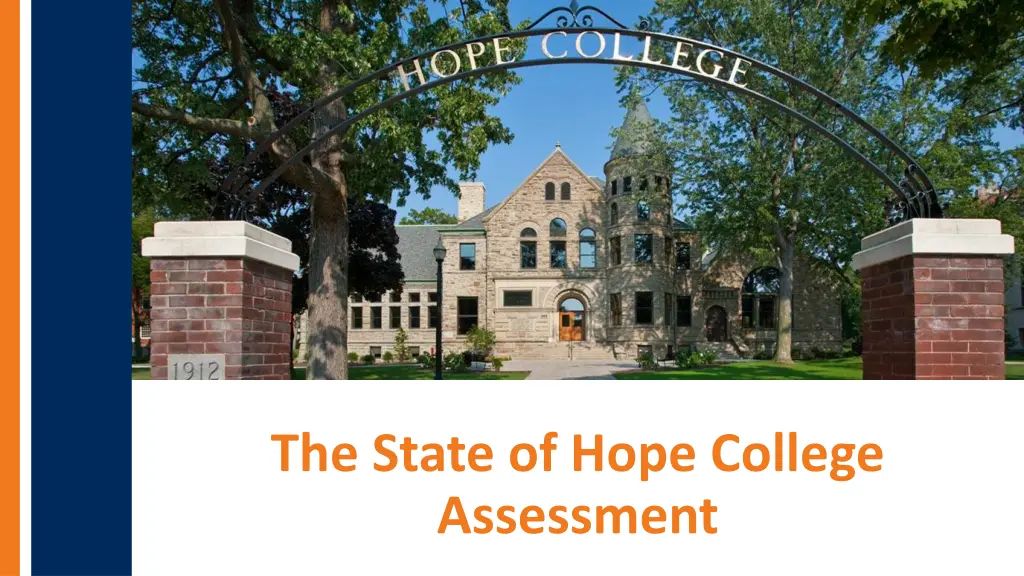
Enhancing Student Learning Through Assessment at Hope College
Explore Hope College's comprehensive assessment plan aimed at fostering a culture of student learning, supporting achievement, and driving continuous improvement. Learn about the assessment cycle, methods of student evaluation, and the use of data for enhancing learning experiences.
Download Presentation

Please find below an Image/Link to download the presentation.
The content on the website is provided AS IS for your information and personal use only. It may not be sold, licensed, or shared on other websites without obtaining consent from the author. If you encounter any issues during the download, it is possible that the publisher has removed the file from their server.
You are allowed to download the files provided on this website for personal or commercial use, subject to the condition that they are used lawfully. All files are the property of their respective owners.
The content on the website is provided AS IS for your information and personal use only. It may not be sold, licensed, or shared on other websites without obtaining consent from the author.
E N D
Presentation Transcript
The State of Hope College Assessment
Hope College Assessment Plan Created by Assessment Committee Foster a student learning culture Supports student achievement Provides a process for sharing evidence of student learning Helps identify and respond to data as a part of a continuous improvement process Demonstrates we meet our institutional mission See the entire plan at: https://hope.edu/offices/frost-research-center/assessment/
Assessment of Student Learning Research Evaluation The use of data for the purpose of describing, predicting, and controlling as a means toward better understanding the phenomena under consideration Huitt, Mummiel & Kaeck (2001) Comparison of data to a standard for the purpose of judging worth or quality Huitt, Mummiel & Kaeck Purpose of improving learning experiences Collect better data about what and how students learn Assfdsa (2001) Using data to make judgments regarding programs or services. (Student Affairs Assessment) Identify learning gaps and address them Leads to action Huitt, W., Hummel, J., & Kaeck, D. (2001). Assessment, measurement, evaluation, and research. Educational Psychology Interactive. Valdosta, GA: Valdosta State University. Retrieved [date], from http://www.edpsycinteractive.org/topics/intro/science.html Henning, Gavin & Roberts, Darby. (2016). Student Affairs Assessment. Routledge.
Assessment of Student Learning Identifies Evaluation Identifies usage and participant numbers Knowledge, skills, & behaviors that students demonstrate after participating in or completing the program or activity quality of activities provided satisfaction credentialing and staff training Are students meeting the set learning standards? resources allocated to the program
Assessment Cycle Assessment: An ongoing, systematic process that begins with developing student learning outcomes, followed by the collection, review, and use of information about those outcomes for the purpose of improving student learning.
Direct Assessment Indirect Assessment Using measures that require students to actually display or demonstrate the extent of their learning Embedded assessments Major field tests Applying rubrics to artifacts Collecting student reflections or self- assessments about student learning without actually demonstrating their knowledge, skills, or behaviors Graduate surveys Senior surveys NSSE
Common Learning Outcomes 2. Approach knowledge with a liberal arts foundation 4. Integrate knowledge, experience and purpose 1. Think Critically and Communicate Clearly 5. Demonstrate cultural awareness and competency 3. Engage in intensive study Assessment Tool Heighten Critical Thinking Assessment Heighten Intercultural Competency and Diversity Assessment NSSE X X X X X X X Intellectual Engagement with the Christian Faith Survey X X Artifacts X 6- Months Out Graduate Survey National Alumni Career Mobility Survey Lifeview Paper Review Schedule Summer of Odd Years Summer of Even Years X X X X X X X
Common Learning Outcome 3 Engage in Intensive Study Six Months Out Graduate Survey 2019-2023 95% of Hope graduates felt they were prepared for graduate school and employment NACM Survey 2021-2023 A higher percentage of alumni feel their bachelor s degree prepared them for their career than the comparison group Hope graduates compare favorably to the comparison group overall
Common Learning Outcome 4 Integrate Knowledge, Experience and Purpose NSSE: Reflective and Integrative Learning Hope senior scores slightly decreased in 2024, but we remain higher than our comparison group of Great Lakes Private institutions. Lifeview Paper 60 papers sampled Some formats of papers lent themselves to better scores Impacted by writing prompt
Common Learning Outcome 5 Demonstrate Cultural Awareness and Competency Heighten ICDA 95% of seniors scored proficient or advanced for Analyze and Act Students who study abroad had higher Approach scores NSSE The target for the diverse others engagement indicator was met Three items where Hope College students scored lower than the GLP institutions may be related to the makeup of Hope s student body
Looking Forward Celebrate! Is the data we re gathering meaningful? Are our current assessment plans meaningful and actionable? Use assessment to make decisions and then tell a story.
Assessment Cycle Assessment: An ongoing, systematic process that begins with developing student learning outcomes, followed by the collection, review, and use of information about those outcomes for the purpose of improving student learning.
Common Learning Outcome Tools Direct Heighten Critical Thinking Assessment Artifacts (APLO 1 Analysis) Senior Seminar Lifeview Paper Heighten Intercultural Competency and Diversity Assessment Indirect National Survey of Student Engagement Intellectual Engagement with the Christian Faith Survey Six Months Out Graduate Survey National Alumni Career Mobility Survey
Intercultural Competency and Diversity First Year Students Senior Students AY 2023-2024 582 119 AY 2024-2025 586 250 Total 1,168 369 Critical Thinking Senior Students AY 2023-2024 41 Fall 2024 19 Winter 2024 106 Total 166
Coming Up in Assessment Increase Assessment Response Rates Survey Schedule and Survey Strategy Anchor Plan Learning Outcome Assessment Artifact Analysis May 19-20 Common Learning Outcome Assessment Engage Assessment Teams for data analysis Outcomes 1 & 2 CLO Reports to AcAB April 15 Program Learning Outcome Assessment Reports due October 1, 2025
Anchor Plan Outcomes 3. Practice Hope College's Virtues of Public Discourse 1. Examine fundamental and emerging questions... 2. Reflect on diverse perspectives... 4. Demonstrate ability to communicate... 5. Analyze evidence or data... 6. Understand Key tenets... 7. Explain one's own values... Assessment Tools Heighten Critical Thinking Assessment X Heighten Intercultural Competency and Diversity Assessment X X Artifacts X X X Lifeview Paper X Review Schedule Summer of Odd Years Summer of Even Years X X X X X X X


